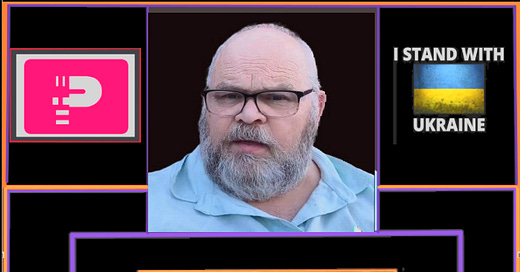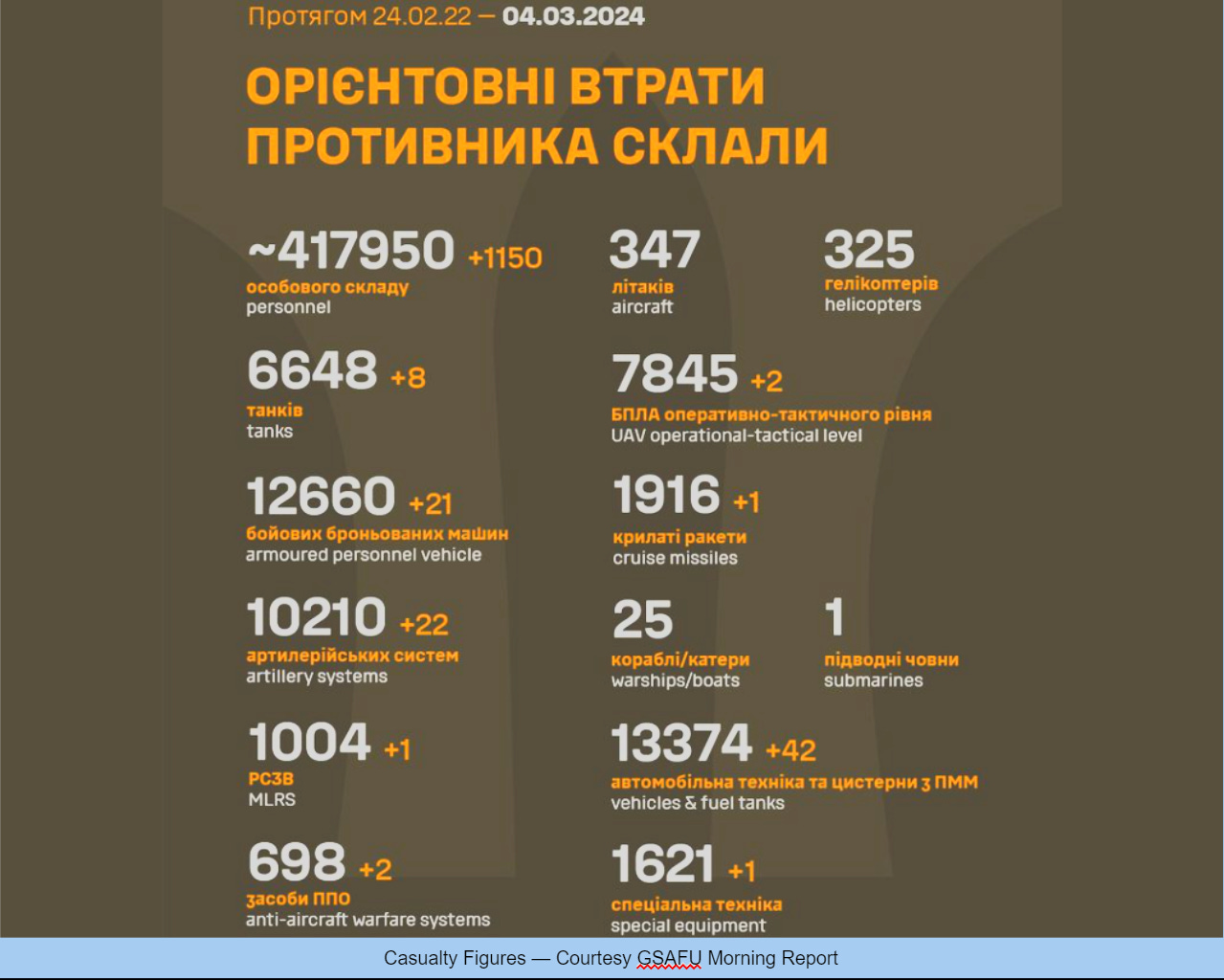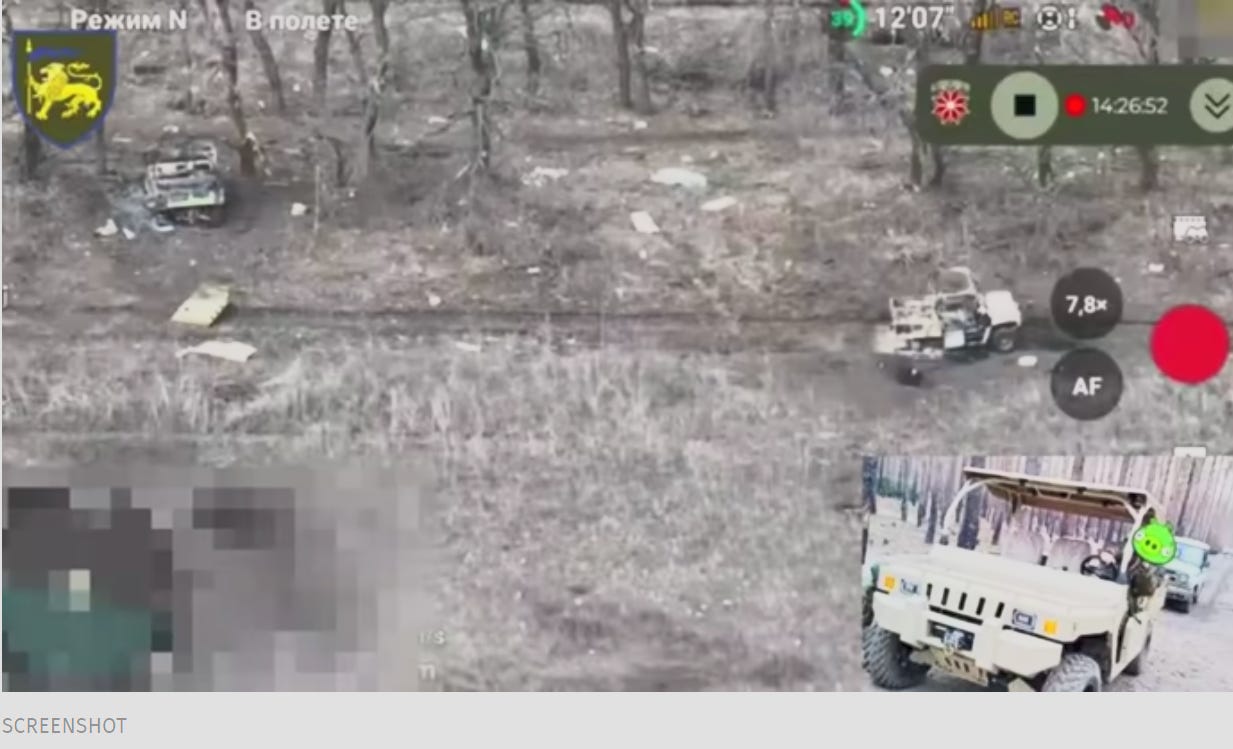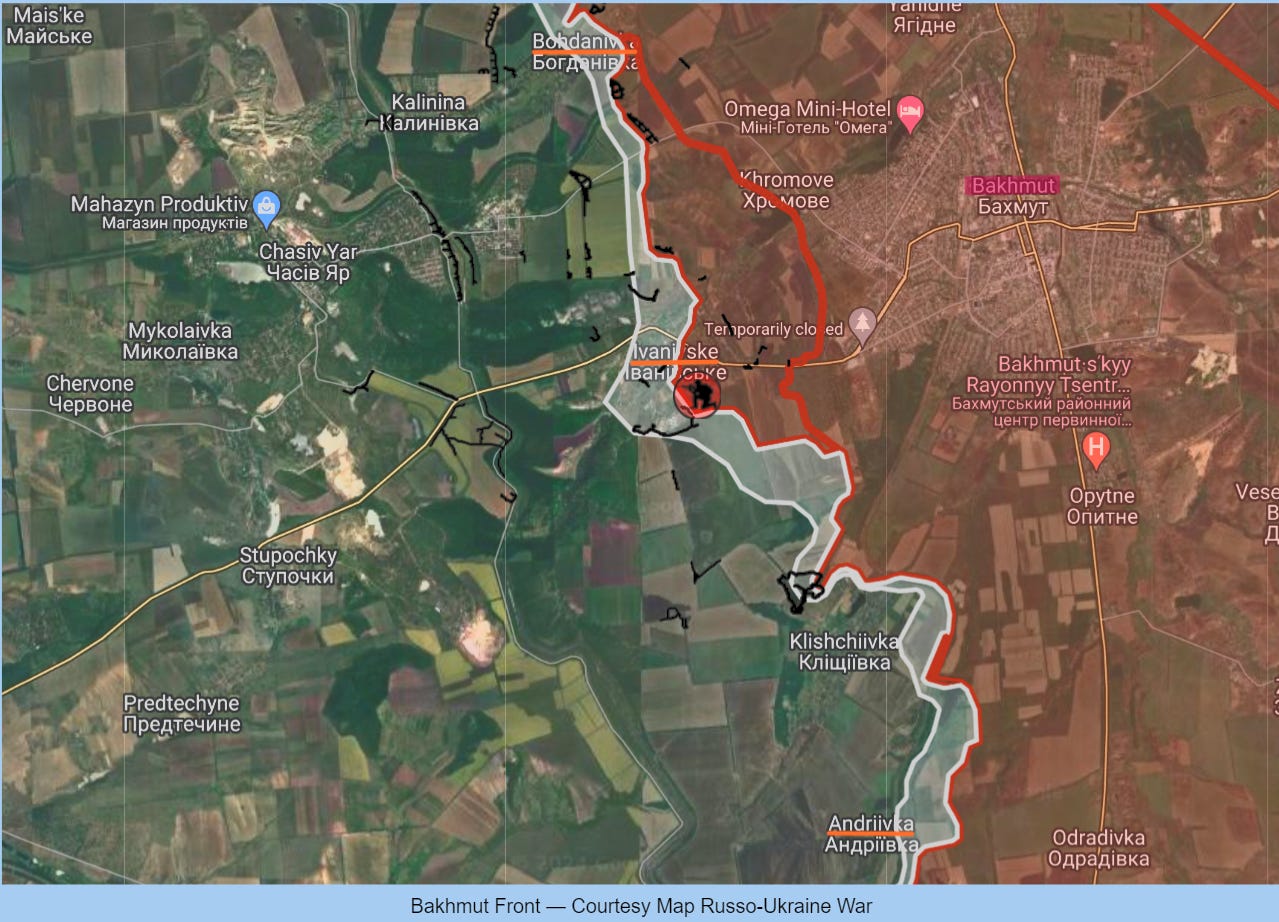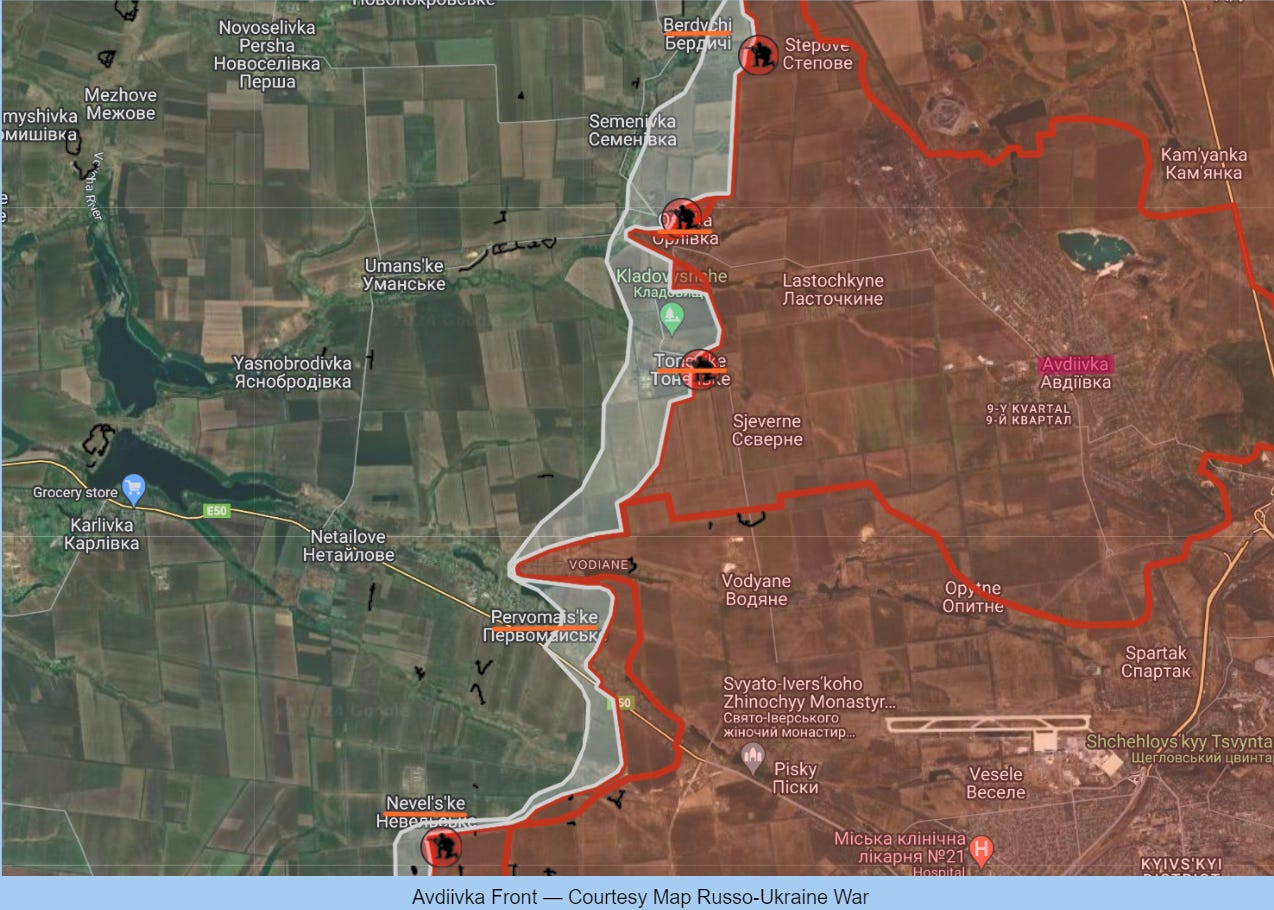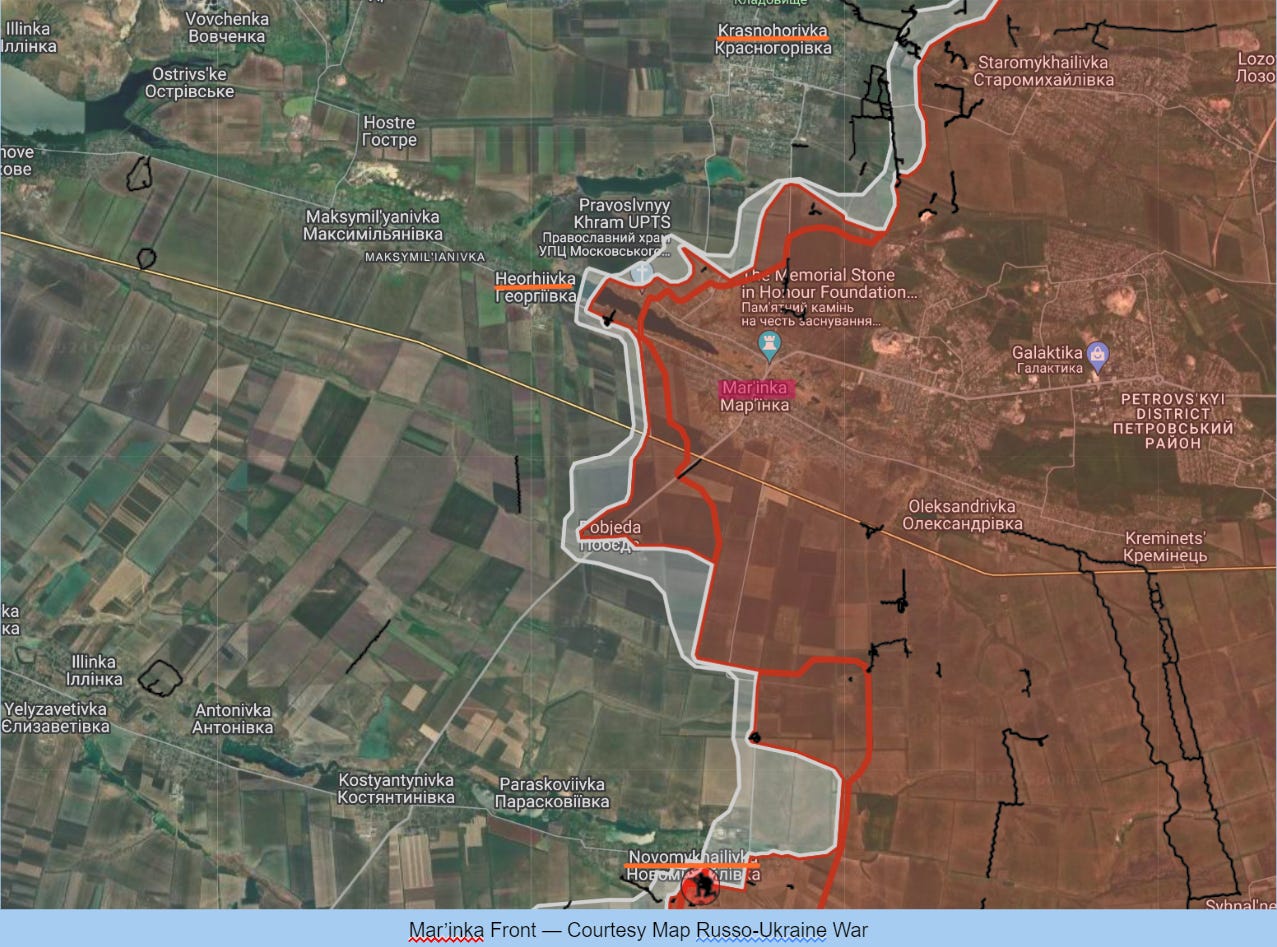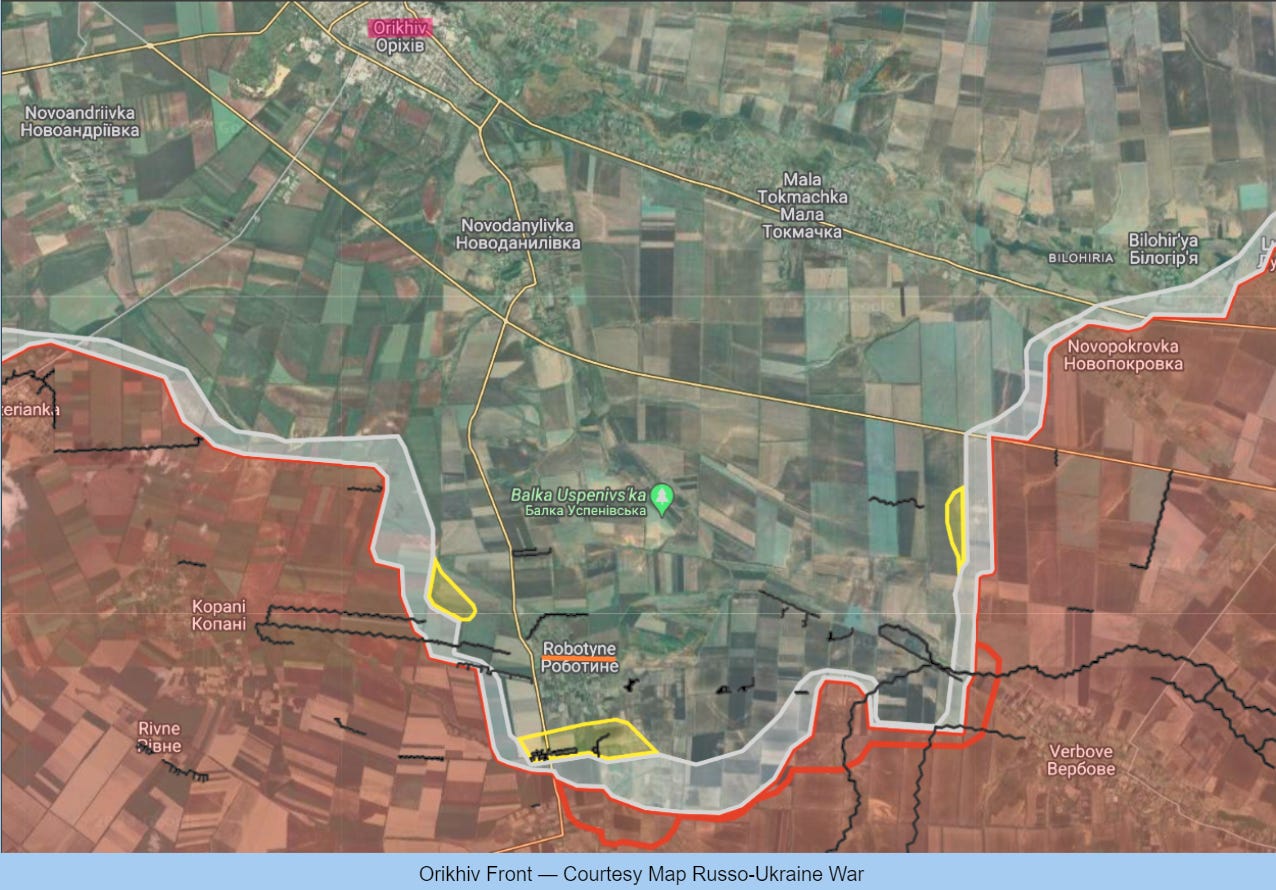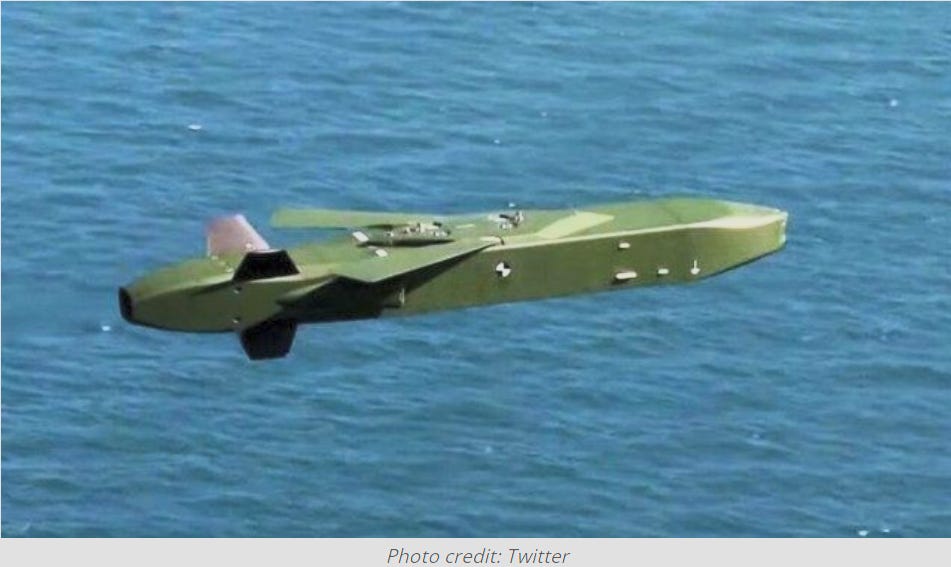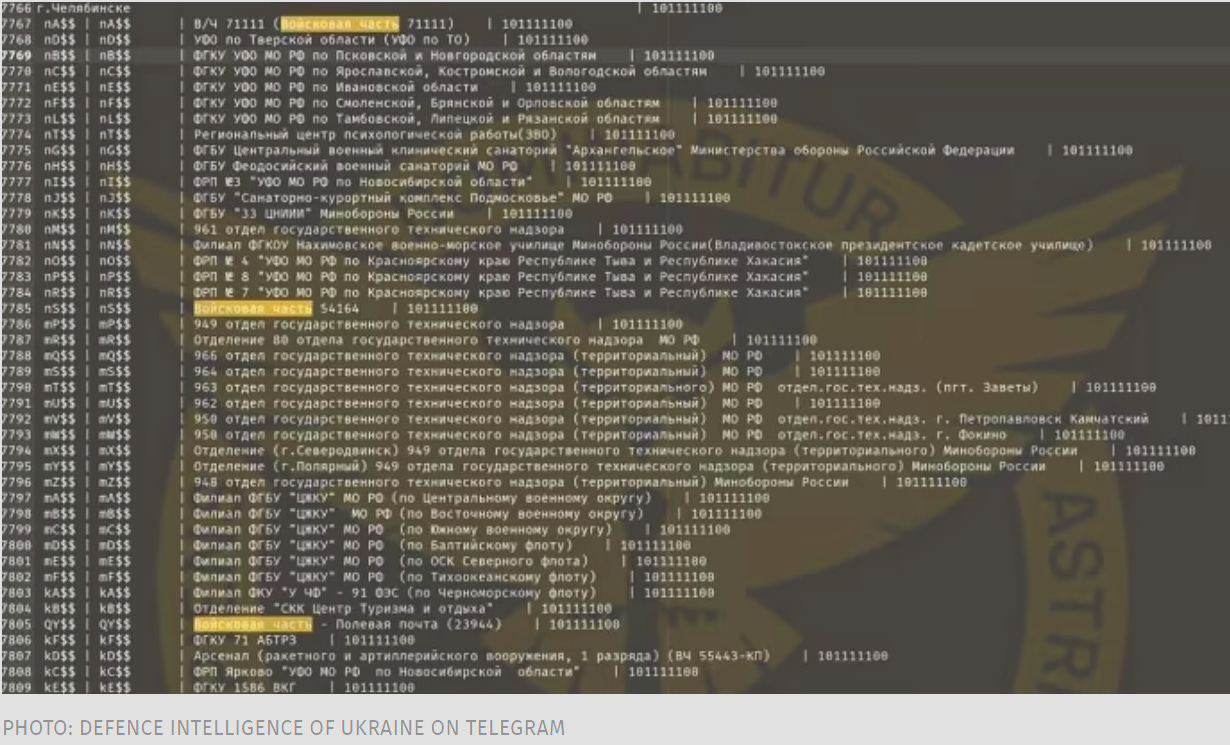Slava Ukraini! Since June 2023 I have provided a daily draft for the Ukraine War Brief Podcast collecting news from over 40 sources daily much of which ends up in the script. I will make this Draft available here for those who wish to keep up with events on a daily basis.
INSIDE UKRAINE
ALONG THE CONTACT LINE
GSAFU Morning Report
The General Staff of the Armed Forces of Ukraine in its situation update at 06:00 on Mar. 4 stated that it was day 740 of the full-scale invasion of the Russian Federation against Ukraine.
During the past day, 78 combat engagements took place. Over the past 24 hours, the enemy carried out 7 missile strikes, 50 air strikes, and 112 MLRS attacks across the positions of our troops and settlements. As a result of the Russian attacks, unfortunately, there are dead and wounded among the civilian population. Destruction and damage to residential buildings and other civilian infrastructure.
At the same time, Ukrainian soldiers continue to inflict losses in manpower and equipment on the occupying troops, exhausting the enemy along the entire front line.
During the day, the aviation of the Defense Forces struck 7 areas of focus of enemy personnel.
The Khortytsia operational-strategic group
(Responsible for the Kup’yans’k, Lyman, and Bakhmut axes, in the northeastern part of Ukraine. )
Kup’yans’k axis: The enemy carried out 11 assaults in the areas of the settlements of Synkivka and Tabaivka (Kharkiv oblast) unsuccessfully trying to improve its tactical position.
Lyman axis: Ukrainian defenders repelled 5 attacks near Terny and Verkhn’okam’yans’ke (Donetsk oblast) plus Bilhorivka (Luhansk oblast)
Russian troops use Chinese-made golf carts for assaults
The 60th Separate Mechanised Brigade of the Armed Forces of Ukraine released a video showing Russian forces attempting to use Chinese-made Desertcross golf carts to storm Ukrainian positions on the Lyman front. I shit you not….
"The other day, the 60th Separate Mechanised Brigade repelled a large-scale Russian attack on the Lyman front, which consisted of three waves. The Russians used tanks, infantry fighting vehicles, infantry, and even [Russian Defence Minister Sergei] Shoigu's Chinese-made golf carts, which he presented to Putin as the latest development of their defence industry. Anything that couldn't escape is now scrap metal on our soil."
Bakhmut axis: Ukrainian forces repelled 5 attacks near Bohdanivka, Ivanivske and Andriivka (Donetsk oblast)
The Tavria operational-strategic group
(Responsible for the Avdiivka, Mar’inka, Shaktars’ke, and Orikhiv axes, in the central-eastern and southeastern part of Ukraine.)
Avdiivka axis: Ukrainian Defense Forces repelled 20 enemy attacks near Berdychi, Orlivka,Tonen’ke, Pervomais’ke and Nevel’s’ke (Donetsk oblast).
Mar’inka axis: Ukrainian Defense Forces continue to hold back the occupiers in the vicinities of Krasnohorivka Heorhiivka, and Novomvahkilivka (Donetsk oblast). Troops repelled 30 attacks in that area.
Shakhtarske axis: The enemy did not conduct any offensive (assault) operations in this area.
Orikhiv axis: Ukrainian Defense Forces repelled 3 attacks near Robotyne (Zaporizhzhia oblast).
The Odesa operational-strategic group
(Responsible for Kherson, Qırım, (also known as Crimea) and the Black Sea.)
Kherson axis: The enemy did not conduct any offensive (assault) operations in this area.
TEMPORARILY OCCUPIED TERRITORIES
Increased presence of Russian forces in occupied territories due to Putin’s election
Ukraine’s National Resistance Center (NRC) has said that more Russian special forces units are arriving in temporarily occupied Ukrainian cities, a move linked to the Russian presidential elections in March.
The NRC elaborated that the arrival of squadrons and Russian Guard (Rosgvardia) units in temporarily occupied territories has been recorded.
"The Russian Federal Security Service (FSB) has been assigned overall control of these units. Their primary objective is to suppress any underground activity that could disrupt the upcoming Russian presidential elections."
— Ukraine’s National Resistance Center
THE HOME FRONT
Nothing to report.
RUSSIAN WORLD
Unknown individuals damage railway bridge, used for transporting ammunition, in Russia's Samara Oblast
Unknown individuals damaged the pillar of a railway bridge in Russia's Samara Oblast using explosives on the morning of 4 March. Ukrainian intelligence reports that this railway branch was used for transporting ammunition, and that the bridge will be unusable for the coming weeks. According to several Russian propaganda outlets.
These outlets reported that unknown individuals had used explosives to damage the pillar of a bridge across the Chapaevka River on the Zvezda-Chapaevsk line.
Sabotage of the Russian railway system has been a constant problem for the Kremlin since the beginning of the full scale invasion two years ago.
Russian propagandist lists German bridges Russia could hit "in return for Crimean Bridge"
Russian propagandist Dmitry Kiselyov, speaking on Vesti Nedeli, his weekly TV “news” show, has named four bridges in Germany that Russia could destroy "in response to a strike" on the Kerch Bridge in occupied Crimea. Russian propaganda sources report.
"Sophisticated as the interlocutors [Ukraine’s Western allies] may be, they do not have images of bridges in Germany in their heads. In this relatively small country, there are no bridges as long as the Crimean Bridge. But there is still plenty to see through a missile sight....It will be a pity, but what can we do? They don't care about our Crimean Bridge."
— Dmitry Kiselyov, Russian propagandist
Kiselyov went on to list four German bridges that Russia could strike in retaliation: the Fehmarn Sound and Rügen bridges in Germany’s north, which connect the mainland with the islands of Fehmarn and Rügen, the Hohenzollern Railway Bridge in Cologne, and the Magdeburg Water Bridge, which connects two canals across the Elbe River, 150 km from Berlin.
Senior Russian official says Russia will not use "state-of-the-art" Armata tanks in Ukraine due to their high price
Sergei Chemezov, CEO of Russian state-owned defence company Rostec, has claimed that "the state-of-the-art" T-14 Armata main battle tanks (MBTs), which Russia showcased in 2015, will not be used in the war against Ukraine, supposedly on account of their high price, although he argues that they are in service with the Russian Armed Forces…. Honest!
"Armata is, in fact, a bit costly. It is undoubtedly superior to existing tanks in terms of functionality, yet its sky-high cost means the army is unlikely to use it now. It's easier for them to get the T-90s."
— Sergei Chemezov, CEO of Rostec
Chemezov claimed that it makes sense for Russia to invest in cheaper weapons. "We currently need funds to develop new tanks, new weapons, perhaps cheaper ones. Therefore, if it is possible to acquire cheaper weapons, why not," Chemezov added.
Grumpy here — It must sting that Putin in a recent speech called the T-90 “the best tank in the world”
WORLD NEWS
Germany probes Russian leak of call where officers discuss Ukraine aid
German authorities are investigating the potential leak by Russian state media of a recorded phone call purportedly between senior military officials discussing lethal support for Ukraine. The Washington Post reports.
The 38-minute recording appeared to capture Germany’s air force chief and three other officers deliberating the theoretical supply of long-range Taurus missiles to Kyiv. It’s a move German Chancellor Olaf Scholz has been reluctant to make, despite pressure from allies, citing fears it would risk Berlin’s direct involvement in the war.
German Defense Minister Boris Pistorius on Sunday described the eavesdropping part of an “information war” waged by Russian President Vladimir Putin.
“It’s a hybrid disinformation attack — it’s about division, it’s about undermining our unity,” Pistorius said here on Sunday. “We must not fall for Putin’s tricks,” he said, adding that Germany will react prudently “but no less decisively” to the leak.
A spokesperson for the German Defense Ministry said Sunday the military’s counterintelligence service would review whether communications were secure enough for such a sensitive conversation, which took place in February.
Audio of the call was first posted Friday on Telegram by Margarita Simonyan, editor in chief of Russian state-controlled broadcaster RT. According to German media reports, the officers used the U.S. communications platform Webex.
“Germany is preparing for war with Russia,” the deputy head of Russia’s Security Council, Dmitry Medvedev, said Sunday, also on Telegram. “Attempts to present the conversation … as a game of rockets and tanks are a malicious lie.”
Johnson gives House GOP’s Ukraine backers room to craft plan as pressure builds for floor vote
Speaker Mike Johnson swiftly derailed the Senate’s bipartisan aid package for Ukraine, but he’s left the door open to a new proposal emerging in the House. CNN reports.
Behind the scenes, Johnson has met privately with House Republicans who have been trying to build support for a new bipartisan foreign aid package that includes restrictions on the US border with Mexico. And now House Foreign Affairs Chairman Michael McCaul is taking a lead role in trying to finalize a proposal and build consensus within the conference as part of a push for floor action by late March or April.
Johnson has not yet taken a position on the plan or committed to giving it a floor vote, telling his colleagues that they need to finalize government funding legislation first. But once that process is done by mid-March, Republican backers of the plan believe he will let it come to the floor – even if it risks backlash from hard-right members or even a vote for his ouster from the speakership.
Yet Johnson’s right flank has pointedly warned him not to approve a dime more of funding for Ukraine.
“That would be a huge mistake,” said Rep. Marjorie Taylor Greene, a Georgia Republican, staunch opponent of Ukraine aid. “The American people don’t support it, and our job title is representative. Our job title is not fund the CIA’s war against Ukraine. That’s not what we’re elected to do.”
Hey Marge, remember the Jewish space lasers? Good times…
Russian foreign ministry summons German ambassador after interception of Taurus missile discussions
The German ambassador to Moscow was summoned to the Russian Foreign Ministry in the wake of a scandal involving a private conversation between German Armed Forces leaders being leaked; the conversation in question regarded the possibility of supplying Taurus missiles to Ukraine. Russian propaganda reports.
The German ambassador arrived at the Russian Foreign Ministry, "where he was summoned in light of the German Air Force officers’ conversation about the attacks on the Crimean Bridge".
Russian Foreign Ministry spokeswoman says Germany "not completely denazified"
Russian Foreign Ministry spokeswoman Maria Zakharova has said that "denazification" in Germany has not been completed, warning it of "dire consequences" after Russian propaganda leaked secret talks between high-ranking German Air Force officers. Russian propaganda reports.
"They (Germans – ed.), as we now understand, have not been fully denazified... The most terrible thing is that this will lead – and this is a fact, you can check… if nothing is done, if this process is not stopped by the German people themselves – first of all, [it will lead] to terrible consequences for Germany itself," she said.
Zakharova said that the West "must be held accountable for the destructive actions that it planned and largely implemented".
How Russia poisons Italy across generations.
In last Friday's edition of the draft we looked at a new report from the Institute of Innovative Governance has been released entitled “Revealing Russian Influence in Europe” The report analyzes publicly available information about Russia’s influencers across media, digital platforms, political parties, business groups, and lobby groups. In total, 360 pro-Russian lobbyists were identified in Germany, France, Italy, and Ukraine seeking to undermine sanctions on Russia and support for Kyiv. This highlights the various forms of Russian influence in European politics and societies.
Today we take another look, specifically at how Russia destabilizes Italy.
Italy remains a pivotal target for Russian propaganda seeking to exploit past ties, though stances have shifted since the Ukraine full-scale invasion. Key aspects include:
Like elsewhere in Europe, the Kremlin draws vocal support in Italy only from fringe far-right and far-left parties now. However, the right-wing Brothers of Italy party leading the governing coalition has strongly backed Ukraine.
Due to historical reasons, Italian regions have a strong identity. Russia takes advantage of this by effectively spreading its propaganda among regional officials.
Russian propaganda has reached Italian school textbooks, some of which, for example, attribute illegally annexed Crimea to Russia.
The Institute of Innovative Governance in its recent report referenced above, identified 39 active pro-Kremlin voices in Italy. By analyzing publicly available but dispersed information, the research maps Russia’s network of influencers embedded in media outlets, digital platforms, political parties, business groups, and lobbying organizations.
The report spotlight key examples of Russian influence in Italy, showcasing the various tactics employed to manipulate European politics and societies. Raising public awareness of these campaigns aims to foster greater resilience.
Before its Ukraine invasion, Russia cultivated regional influence networks in Italy, exploiting strong local identities. Moscow backed groups like the Lombardy Russia Association, Liguria Russian Association and Veneto Russian Association to sway right-wing politics. They helped advance Moscow’s aims – from pushing policies recognizing occupied Crimea as Russian to arranging official regional visits there.
Pro-Russian Italian organizations promote propaganda movies about places like Russian-occupied Mariupol in coordinated campaigns, engaging the cultural sphere while keeping some distance from politics. This indirect, normalized technique spreads narratives favoring Russia.
Italian school textbooks are another conduit for Russian propaganda, the analyst explains. Some directly transmit Kremlin narratives, portraying Ukraine as part of a “Russian region” and calling Kyiv its oldest city. This poisons Italian public discourse.
Economic ties rooted in energy bind Italy and Russia. Their governments fostered partnerships across sectors like manufacturing and agriculture, with Italy relying on Russia for 40% of annual energy imports pre-2022 when over 400 Italian businesses operated in the country. Overall export dependence was just 1.5%, but corporations created enduring links.
These compound reasons why sympathy for Moscow persists – the legacy of Italy’s influential pro-Soviet Communist Party anchoring networks across media, academia and industry figures who routinely tout Russian connections unchecked. With politicians emphasizing special relationships, public discourse stays vulnerable to Kremlin manipulation.
European Commission will not hold talks with Russia on continuation of gas transit through Ukraine
Kadri Simson, European Commissioner for Energy has said that the European Commission does not intend to negotiate with Russia to continue the transit of Russian gas to European countries through Ukraine's gas pipeline system, instead aiming to wean itself off Russian gas completely. UKrinform reports.
"I made it very clear to our Ukrainian partners that the European Commission will not be involved in [negotiations] with Russia, as it did five years ago when a trilateral gas transit agreement was made. On the contrary, according to our RePowerEU plan, we should cease using Russian gas by 2027 at the latest. We are working overtime to provide countries with alternative supply routes and alternative suppliers, and at the same time to support Ukraine and its further integration into the EU energy market."
— Kadri Simson, European Commissioner for Energy
MILITARY & TECH
Ukraine's Defence Intelligence reports on hacking Russian Defence Ministry servers: much information obtained
Defence Intelligence of Ukraine (DIU) has reported that its cyber specialists have gained access to the servers of the Russian Defence Ministry and obtained a lot of data about the Russian military leadership, orders, reports and directives.
"The Ukrainian intelligence service now possesses software for information protection and encryption, previously used by the Russian Defence Ministry, as well as a trove of classified official documents belonging to the Russian Ministry of War."
The information obtained includes orders, reports, directives, reports and other documents circulated among more than 2,000 structural units of the Russian Defence Ministry.
DIU said this information allows it to establish the complete structure of the Russian Defence Ministry and its branches.
"Analysis of the data obtained has also helped identify the generals, other senior officials of the Russian Defence Ministry structural units, as well as deputies, assistants and specialists − everyone who used the electronic document circulation software called Bureaucrat," DIU said.
The intelligence service specified that they obtained official documentation from Russian Deputy Defence Minister Timur Vadimovich Ivanov, who "played an important role in making the cyberattack successful".
DIU says that operations in Russia's cyberspace are ongoing.
That’s it for today’s Draft folks if you would like to keep up with events in Ukraine daily please consider subscribing, its free!
Feel free to share this update with your friends. Heroyam Slava!


